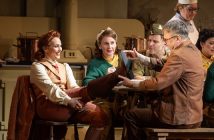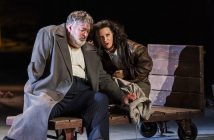Don Carlo is sometimes described as Verdi’s masterpiece. It is equally often referred to as a “problem” opera. Both statements have some truth because this is a complex work with an equally complex history. It started life as Don Carlos sung in French and based on the play by Schiller. It later became an Italian opera, changing its name to Don Carlo. There were frequent reworkings and cuts (though this remains Verdi’s longest opera) that might suggest even Verdi felt that it didn’t quite work.
So does it? Preposterous plots in opera are two a penny but they are usually so driven by great passions (love, revenge, jealousy) and the music itself that this doesn’t really matter. Don Carlo has all the right ingredients, starting with Verdi’s lush, powerful score. And this is the grandest of grand operas, set in 16th century Spain and France, amid war, cruel religious oppression, and brutal empires. Against this backdrop is a love story doomed from the first scene and a father who has never loved his son. So shock and awe all the way, plus pity for the doomed lovers. Unfortunately, in this production, you’re more likely to suppress a titter than wipe away a tear. Even some of the most climactic moments – such as when the heretics are burned in the auto-da-fe – seem slightly absurd, especially given it all happens off stage. The chorus (in tremendous voice incidentally) are supposed to be a mob baying for blood in this scene but are shuffled about the stage to little effect.

Nicholas Hytner’s production, first seen in 2008, has been revived for a third time. There have been a few changes – notably the auto-da-fe scene – in which the action now takes place off stage, leaving something of a hollow in one of the opera’s climactic moments. Appropriately dark and brooding in its set and with cleverly sixteenth century chiaroscuro lighting effects, the production nevertheless loses sight of the intense drama at the heart of this grand and musically rich opera. For this is a static production in every sense. There is little action and while the lighting is suitably chiaroscuro, the set mostly seems to get in the way and the singers stand on the vast stage with little dramatic tension between them. The singing, though, is another matter.
Philip II of Spain is finely sung by Ildar Abdrazakov though his attempts to make him a complex, tortured soul are unconvincing – this is a king who demands the deaths of everyone from heretics in Spain to rebels in Flanders and even his own son, Don Carlo. Bryan Hymel in the title role is musically on tremendous form and brought real intensity to the role. His relationship with his Elisabetta (Kristin Lewis), though, was unconvincing and there was certainly no on-stage chemistry. This cannot have been helped by the fact that both Lewis and Christoph Pohl (a magnificently sung Rodrigo and the most coherent and subtle performance of the night) were both brought in as last-minute substitutes. Musically, this is a great night – the chorus and the orchestra are superb and the richness and intensity of Verdi’s music is palpable. On the staging level, though, it’s like the auto-da-fe without the flames – a passion-free zone.
Don Carlo at the Royal Opera House until 29th May 2017. Running time approximately 4 hours 10 minutes including two intervals. For more information and tickets please visit the website. Production images by Catherine Ashmore.




